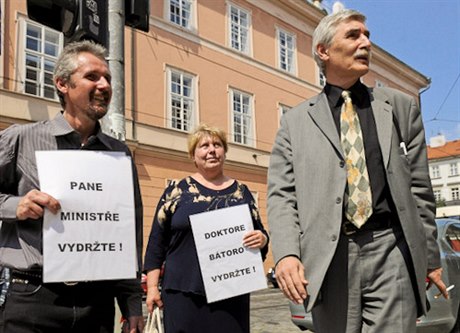Czech neo-nationalist Ladislav Bátora announced his resignation from the Education Ministry in October, after considerable public pressure and the center-right TOP 09 party threatened to leave the governing coalition unless he was removed as deputy head of ministerial office. Nevertheless, Bátora remained employed by the ministry under a new position until the end of 2011, when it was abolished — making him eligible for a redundancy payment.
According to the daily Mladá fronta dnes (MfD), Education Minister Josef Dobeš (Public Affairs, VV) gave the controversial far-right civil servant a Kč 250,000 golden handshake. The ministry’s press department on Monday confirmed Bátora was given redundancy payment but refused to disclose the sum; Dobeš refused to comment. “I admit that I will not provide comment to you about this issue,” he told the newspaper when asked why Bátora had been given such a large redundancy payment.
Bátora, currently active in the eurosceptic grouping D.O.S.T. (“Trust, Objectivity, Freedom and Tradition”), whose acronym translates as “enough” in English, had once been a candidate for the extremist National Party (NS) and has taken part in lectures organized by the ultra-nationalist Patriotic Front.
Although Bátora is a divisive figure, it is not the first time that Dobeš has come under fire for both his choice of — and compensation to — employees at the Education Ministry. As Czech Position previously reported, his spokesman, Václav Koukolíček, received a gross wage of Kč 129,321 — an unusually high salary for a civil servant — and an assistant of Dobeš’s with dubious credentials, Jana Machálková, received a December wage of Kč 145,330 from the ministry, including bonuses. Dobeš has also paid out quarterly bonuses exceeding Kč 100,000.
‘I’ve no interest in telling you anything. I left precisely so I don’t have to hold discussions with the media.’
Bátora has not denied receiving a handsome golden handshake but refused to disclose the actual sum, on the grounds that it is not for him to disclose such information: “Ask in the ministry. I’ve no interest in telling you anything. I left precisely so I don’t have to hold discussions with the media,” he told MfD. He hung up when the daily pressed him on the amount he had received.
Dobeš’s refusal to speak to the issue could contravene Czech law. Oldřich Kužílek, an adviser on freedom of information in state administration, earlier told Czech Position that the public is entitled by law to know the qualifications of and other details about their civil servants (Personal Data Protection Act, Act No. 101/2000 Coll. - §5 Paragraph 2, Section f).
“If a public office refuses to communicate with a particular journalist because they ask difficult factual questions, then they are, in my opinion, failing in their duty to provide information about the office’s work. This is required by Article 17 Paragraph 5 of the Charter of Fundamental Rights and Basic Freedoms,” Kužílek said.
The question of exceptionally high bonuses to public officials is not limited to the Education Ministry; ten senior officials in the Interior Ministry , for example, earned more on average per month in 2010 than did any Cabinet minister (at Kč 106,900 per month) with many earning more than Prime Minister Petr Nečas (Kč 150,400) and President Václav Klaus (Kč 186,700 per month).
‘Administrative matters’
When Bátora had announced his resignation on October 14, 2011, he led the public to believe he would leave the ministry within days. “Today I am resigning from the post of deputy chancellor of the minister’s office, and after sorting out the relevant administrative matters I will leave the service of the education ministry altogether,” he told the media.
It transpired that the “administrative matters” to which Bátora referred involved continuing to advise Dobeš on economic issues approximately four hours a week and preparing reports and documentation for him, in a new official capacity as the minister’s aide. And he remained an employee of the ministry until the end of 2011.
In the Czech Republic it is highly unusual — especially in the public sector — that employees who resign from a job of their own accord receive any leaving bonus, let alone a redundancy payment. The Education Ministry nevertheless insists the special treatment for Bátora was lawful.
“The Ministry continues to hold its consistent opinion that apart from the minister and deputy ministers, it does not monitor wages and bonuses. Mr. Bátora’s term of employment ended on December 31, and he received financial remuneration completely in line with employment laws and the collective contract,” education ministry spokesman Antonín Zelenka told MfD in an email.
MfD says it learnt from a reliable source that Bátora’s Kč 250,000 golden handshake represented five monthly wages for the post of deputy chancellor of the minister’s office — the position created when he joined the ministry in March last year, and formally abolished when he announced his resignation in October.
Nevertheless, the ministry says Bátora’s remuneration also related to his work as part-time aide to the minister in November and December. “Mr. Bátora remained an employee after his resignation. He accepted the post of aide. For organizational reasons his place was then abolished; thus, he had a legal right to redundancy payment,” Zelenka explained.
The chancellor of the minister’s office, Martin Krejza, who took up the post on October 12, 2011, said that although he did sign the relevant documents, he doesn’t remember the content, and says he doesn’t know the circumstances surrounding Bátora’s exit from the ministry nor his redundancy payment. Krejza said the question was for the head of the personnel department, adding he doubted the official would reveal any details, citing privacy laws.
Friends in high places
There has yet to be a definitive explanation as to how Bátora, who once stood as a candidate for the extreme right-wing National Party (NS), landed a job in education ministry under Dobeš, though it is widely believed in political circles that President Václav Klaus — who has said he identifies and agrees with much of what Bátora says — persuaded Dobeš to accommodate him in the ministry. Several months ago despite complaints about him from teachers unions and universities and several scandals, Klaus declared that Dobeš is the “best education minister” in the Czech Republic’s post-communist history.
Bátora is known to be closely associated with members of Klaus’ administration, especially Ladislav Jakl, who he has known for some 20 years. There is speculation in political circles that Klaus intends to form a new, euroskeptic conservative party when he ends his second term in March 2013, and that he is counting on Bátora as an ally.




